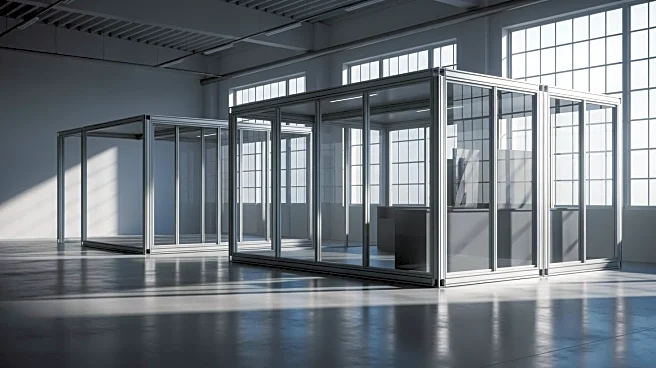What is the story about?
What's Happening?
Governor Barr of the Federal Reserve delivered a speech addressing the current economic outlook, highlighting concerns over rising inflation and tariffs. Barr noted that inflation, measured by personal consumption expenditures (PCE), has increased to 2.7% in August, with core PCE inflation at 2.9%. This rise is attributed to recent tariff hikes, which have significantly impacted core goods inflation. The Federal Open Market Committee (FOMC) recently reduced the policy rate by 25 basis points, a decision supported by Barr, to address these economic challenges. Barr expressed concerns about the labor market, noting a sharp drop in job creation since May, which poses risks to employment. He emphasized the importance of cautious monetary policy adjustments due to uncertainties surrounding inflation and labor market conditions.
Why It's Important?
The speech by Governor Barr underscores the complexities facing the U.S. economy, particularly the dual challenges of inflation and employment. Rising tariffs have contributed to inflationary pressures, complicating the Federal Reserve's efforts to achieve its 2% inflation target. The labor market's slowdown further adds to the economic uncertainty, potentially affecting consumer spending and overall economic growth. The Federal Reserve's cautious approach to monetary policy reflects the need to balance these risks while supporting economic stability. Stakeholders, including businesses and consumers, may face challenges as inflation impacts purchasing power and employment opportunities remain uncertain.
What's Next?
The Federal Reserve is expected to continue monitoring economic indicators closely, with the next FOMC meeting scheduled at the end of the month. Future policy decisions will likely depend on incoming data regarding inflation and employment. The ongoing federal government shutdown may also influence economic conditions, potentially affecting GDP growth. Businesses and consumers should prepare for potential adjustments in monetary policy as the Federal Reserve navigates these economic challenges. The impact of tariffs on inflation and the labor market will remain key considerations in shaping future policy actions.
Beyond the Headlines
The speech highlights the broader implications of tariff-induced inflation, which may alter consumer expectations and spending behaviors. The persistence of inflation above the target could lead to long-term shifts in economic policy and consumer confidence. Additionally, the labor market's vulnerability to negative shocks emphasizes the need for strategic policy interventions to support employment. The Federal Reserve's cautious approach reflects the delicate balance required to manage inflation and employment risks effectively.
















